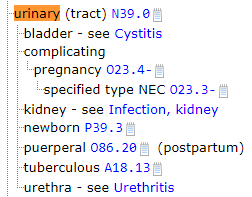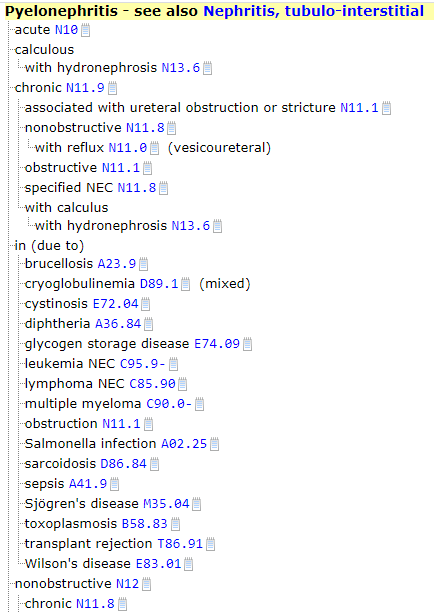UTI ICD 10 – Urinary Tract Infection
Let us study about Urinary Tract infections symptoms, UTI ICD 10 Codes and guidelines with examples.
Urinary Tract infection (UTI) is a very common infectious disease occurs commonly in aged women. As age goes up there will be structural changes happening in kidney. Muscles in the bladder, urethra and ureter become weaken. Urinary retention gets increased in the bladder and this creates an environment for bacterial growth.
Infection can happen in any part of the urinary tract – kidney, ureter, bladder or urethra. It is called as Cystitis, Urethritis and Pyelonephritis based on the site.
Symptoms and Tests
Patients may complain of one or multiple symptoms which include fever, dysuria, hematuria, incontinence, decreased urine output, pain in abdomen or back, nausea, vomiting or diarrhea. Physician does a thorough physical examination and takes clinical history of the patient. Urinalysis and urine culture are the lab tests used to confirm UTI.
UTI ICD 10 Codes and guidelines
UTI ICD 10 codes and guidelines for UTI can be found in chapter 14 of ICD-10-CM manual which is “diseases of the genitourinary system”, code range N00-N99
| ICD-10 codes | Description |
| N39.0 | Unspecified urinary tract infection |
| N30.00 – N30.91 | Cystitis |
| N34.0 – N34.3 | Urethritis |
- It is not necessary to mention the infectious agent when using ICD N39.0.
- If the infectious organism is mentioned, place the UTI code primary and organism secondary.
- Site specified infection should be coded to the particular site. For example, Infection to bladder to be coded as cystitis, infection to urethra to urethritis.
- Infection to kidney, called Pyelonephritis should be coded to the specific code as given in the screenshot below.
- Avoid coding unspecified UTI (N39.0) when specific site infection is mentioned. For example if both cystitis and UTI are mentioned it is not necessary to code UTI, instead code only cystitis.
- Urosepsis – This does not lead to any code in the alphabetic index. Provider should be queried on this as there is no by default code to be assigned for urosepsis.


Below examples will help us understanding how to code UTI.
UTI ICD 10 Codes Example 1
65-year-old Mary visits clinic with fever, dysuria, tachycardia and altered mental status from past one week. Her examination found an indwelling Foley catheter, but patient is unable to remember the reason for placing this catheter. Catheter was removed and sent for culture. Blood tests and urine tests were also ordered apart from this. Patient is admitted for further evaluation. Her discharge diagnoses are:
E.Coli sepsis due to UTI, E.Coli UTI due to indwelling catheter.
UTI ICD 10 codes for this scenario would be:
T83.511A – Infection due to indwelling catheter
A41.51 – E.coli sepsis
N39.0 – UTI
R00.0 – Tachycardia
R41.82 – Altered mental status
Note: Category T83.5 has note to use additional code to identify infection. Here, complication code should be coded primary followed by sepsis.
UTI ICD 10 Codes Example 2
Jennifer is a 20-year-old student presents to clinic for urinary frequency, dysuria and suprapubic pain started 2 weeks ago. She has a history of UTI 2 years back. She is sexually active, but states that she finds it uncomfortable. She feels burning sensation when urinating. She takes 3-4 glasses of water in a day. Physical examination documented tenderness in the suprapubic region and anterior vaginal wall. Urine culture is done for further investigation. Physician has mentioned “cystitis” in the final assessment.
UTI ICD 10 codes for this scenario would be:
N30.90 – Cystitis
Note : Not coded UTI (N39.0) as there is site specific diagnosis cystitis is mentioned.
UTI ICD 10 Codes Example 3
Andrea is a 50-year-old woman coming to emergency room for pain when urinating and burning sensation. She does feel lower back pain from 3 weeks. She never had any urinary problems earlier. She is a diabetic patient and takes insulin daily. Physical examination shows abdominal tenderness. Pelvic examination is normal. No signs of vaginitis or cervicitis found. Urinalysis is done based on the examination. After reviewing the results the case was diagnosed as UTI.
UTI ICD 10 codes for this scenario would be:
N39.0 – UTI
E11.9 – Diabetes
Z79.4 – Insulin use